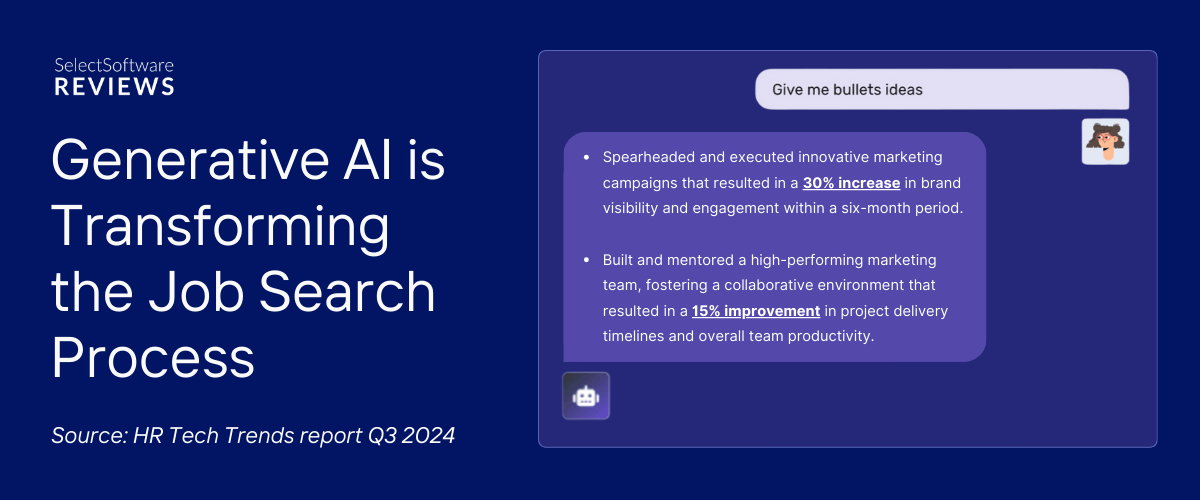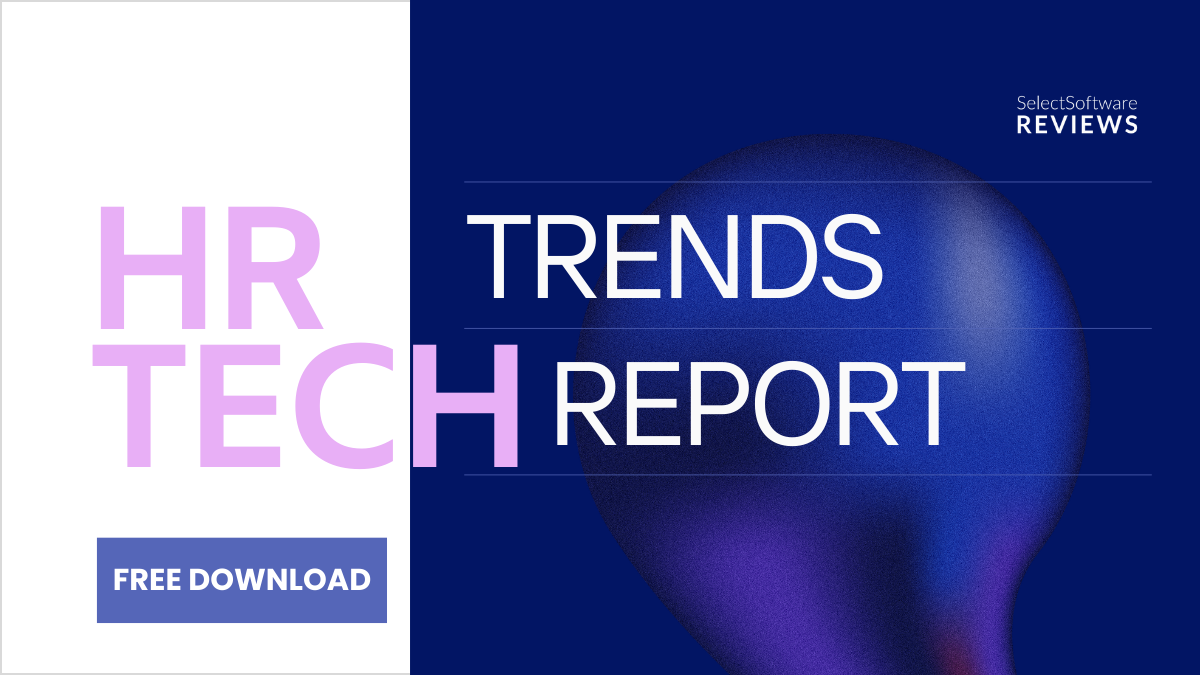You're here for the latest HR technology trends and insights to stay informed and ahead of the curve, so let’s dive right in.
Just some context on how we gather these data points for transparency: They’re derived from our Advisor program, where we connect with HR managers, business leaders, and Talent Acquisition (TA) leaders and guide them toward the most suitable HR tech solutions for their unique needs, for free.
Through these conversations, we've identified some key recruitment and HR tech trends. Notably, there is a continued rise in the adoption of artificial intelligence (AI) among HR departments, job seekers are increasingly leveraging AI to differentiate themselves, and the overall HR tech market is on a positive growth trajectory.
The following sections will provide more details, and if you’re interested, here is the link to download our full HR Tech Trends Report.
Top Pain Points for HR Tech Buyers
In October 2024, we engaged with talent managers and business leaders to better understand their needs and challenges in buying HR technology. Notably, over 25% of these conversations involved companies seeking their first-ever HR system—highlighting a growing recognition of the need for tech-driven HR solutions, even for those navigating the selection process for the first time.
Many HR teams cited an overwhelming number of choices in the marketplace as their biggest hurdle. With numerous platforms available, distinguishing between the options becomes challenging—particularly for those without a dedicated HR tech background. Concerns about overcommitting to an HR platform vendor also emerged, highlighting the need for flexibility during the decision-making process.
Key Reasons to Switch HR Tech Vendors

Manual processes remained the biggest driver of providers switching in Q3, with 25% of HR leaders expressing dissatisfaction with manual-heavy workflows. Outdated or clunky technology and customer service issues also ranked high among reasons for switching vendors.
AI is Here to Help Overworked HR Teams, Not Replace Them
AI adoption in HR has been a major topic of interest in 2024. Earlier this year, 85% of CHROs expressed interest in incorporating AI into their tech stack. However, the level of actual adoption still varies significantly. According to the Institute for Corporate Productivity (i4cp), AI usage in HR doubled compared to last year, with 41% of departments now utilizing AI and machine learning to streamline their recruitment, performance management, and overall HR processes. However, only 13% of HR teams use generative AI extensively—indicating that many are still figuring out how to take full advantage of these new technology advancements.

AI is primarily being used for tasks such as screening applicants, writing job descriptions, creating interview questions, facilitating self-service onboarding, scheduling interviews, and tracking employee data and metrics (i.e., DEI, employee engagement, and retention). Jennifer Sales, our Head of RevOps, attended the 2024 HR Tech Conference and summed it up well:
"AI and automation are elevating HR practices to new heights. Companies are leveraging AI and ML algorithms not just for efficiency, but to deliver truly personalized employee experiences that align with their broader, strategic initiatives."
Despite the fear that AI might replace HR professionals, this technology is actually helping to reduce their overwhelming workload. For example, Talker’s study on HR employee well-being found that 81% of HR professionals who use AI report that it helps them automate routine HR functions, allowing them to leverage people analytics and big data to build a meaningful and engaged work environment. On average, AI-powered HR software now handles 34% of HR-related tasks within the companies surveyed.
This is a welcome change, considering the immense pressure HR professionals have been under. The report, although optimistic, also paints a stark picture of the challenges HR teams face.
Only 9% of HR professionals consistently complete their daily tasks, and 42% admit to working outside regular business hours to keep up. A significant 28% feel overwhelmed by their workload, estimating that they would need to outsource 31% of their tasks to manage effectively.
The report also highlights the toll this pressure takes on mental health. Nearly one-third (30%) of respondents feel mentally drained, 24% report experiencing burnout, and 34% are considering leaving the profession altogether.

In light of these findings, the ability to relieve HR professionals of repetitive and time-consuming tasks from modern technologies like HR chatbots, recruiting automation software, and human resource management systems is more crucial than ever, offering a much-needed reprieve for a department that is often stretched way too thin.

Generative AI Transforms the Job Search Process
Generative AI is not only transforming HR practices but also revolutionizing the job search process for candidates. According to Carnegie Mellon University, platforms like ChatGPT have become popular apps for personalizing resumes, crafting cover letters, and even preparing for interviews. This trend signifies broader AI implementation across both sides of the hiring equation, enhancing efficiency and precision in both job searches and recruitment.
For instance, JobCopilot is an AI platform that automates job searching by scanning listings and applying to roles on behalf of job seekers. While this may make some recruiters uneasy, it’s an indication of AI reshaping not only the recruitment process but also the entire application workflow—aiming for better alignment on both sides.

HR Tech Market Shows Steady Growth Across Key Segments
The HR tech market continues its steady growth, led by key segments such as Human Capital Management (HCM) and Applicant Tracking Systems (ATS). In 2024, the ATS market surpassed $3 billion in total revenue for the first time, and it is projected to continue growing at an impressive rate. HCM software is predicted to reach $70.1 billion by 2028, a substantial increase from its current valuation of $52.1 billion.

Companies like Deel, Oyster, and CloudPay have also made major strides this quarter, each raising significant funding to expand their capabilities. In addition, LinkedIn headcount trends from 26 major HR tech players show that 18 of these 26 companies have grown since 2023, demonstrating the industry's resilience and recovery after earlier headcount reductions.

Conclusion: Embracing Growth in HR Tech
Overall, 2024 demonstrated continued growth, increased AI adoption, and a strong emphasis on modernizing HR tech across the industry. For HR professionals, AI is not a threat but an asset that offers powerful predictive analytics and automation for bettering workforce planning, preventing attrition, enhancing the employee experience, and facilitating data-driven decision-making. For job seekers, AI offers a new level of personalization that has the potential to transform the job search process.
If you found these HR Tech insights valuable, be sure to explore more in our comprehensive HR Technology Trends Report. Download it today to gain the essentials for creating effective HR strategies and get ahead of what's next in HR tech!
Download the Full SSR HR Tech Trends Report Here

























